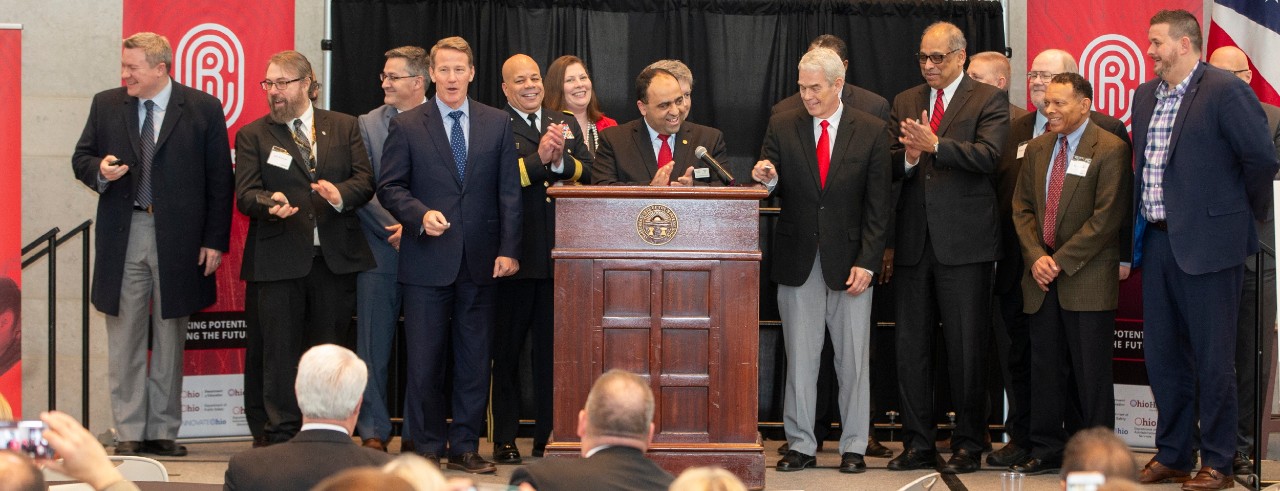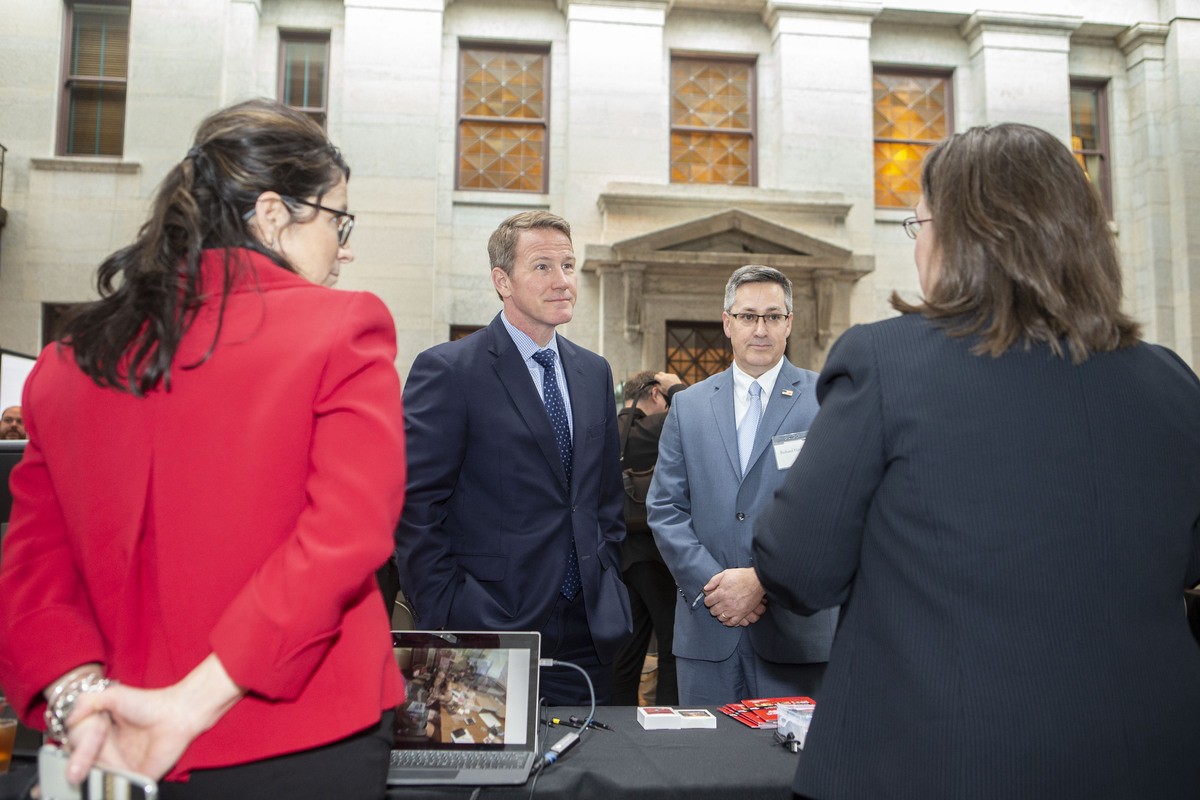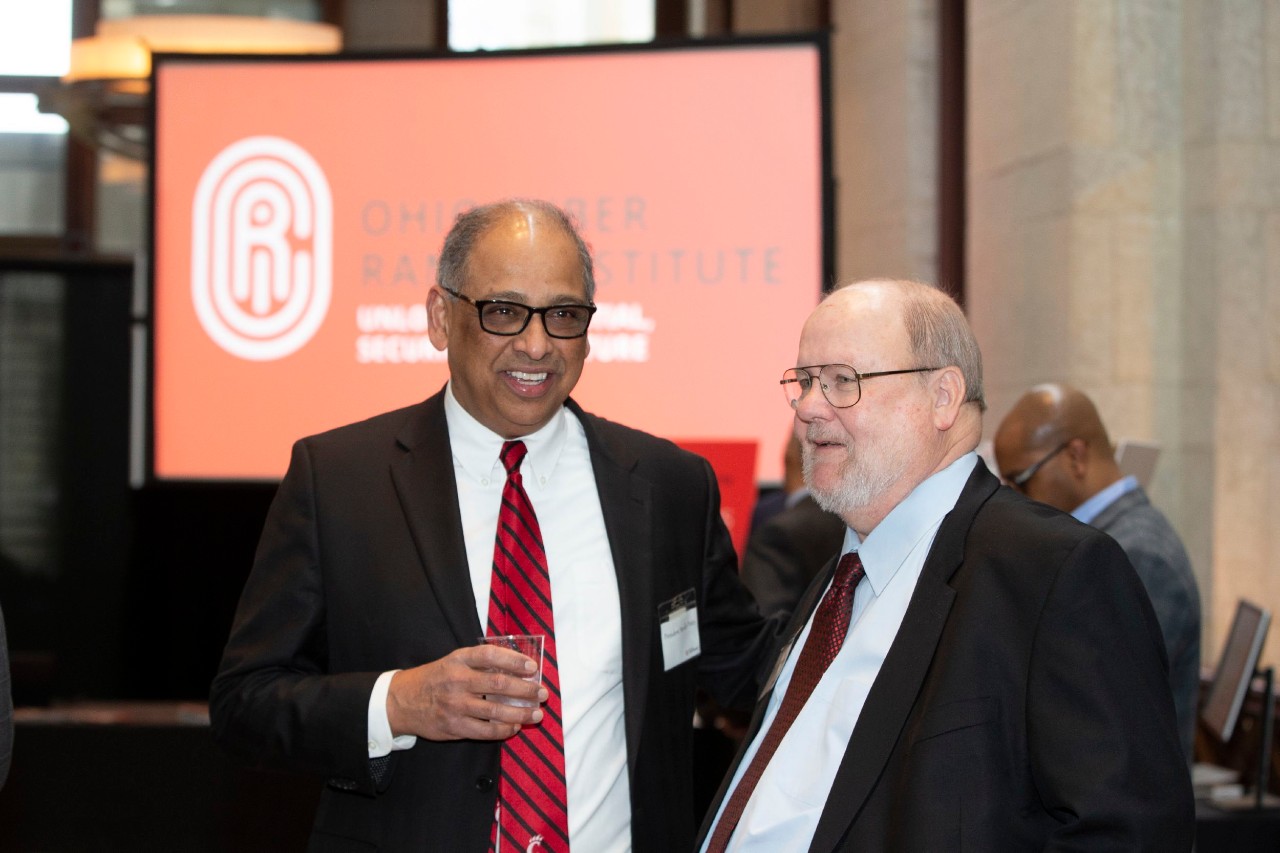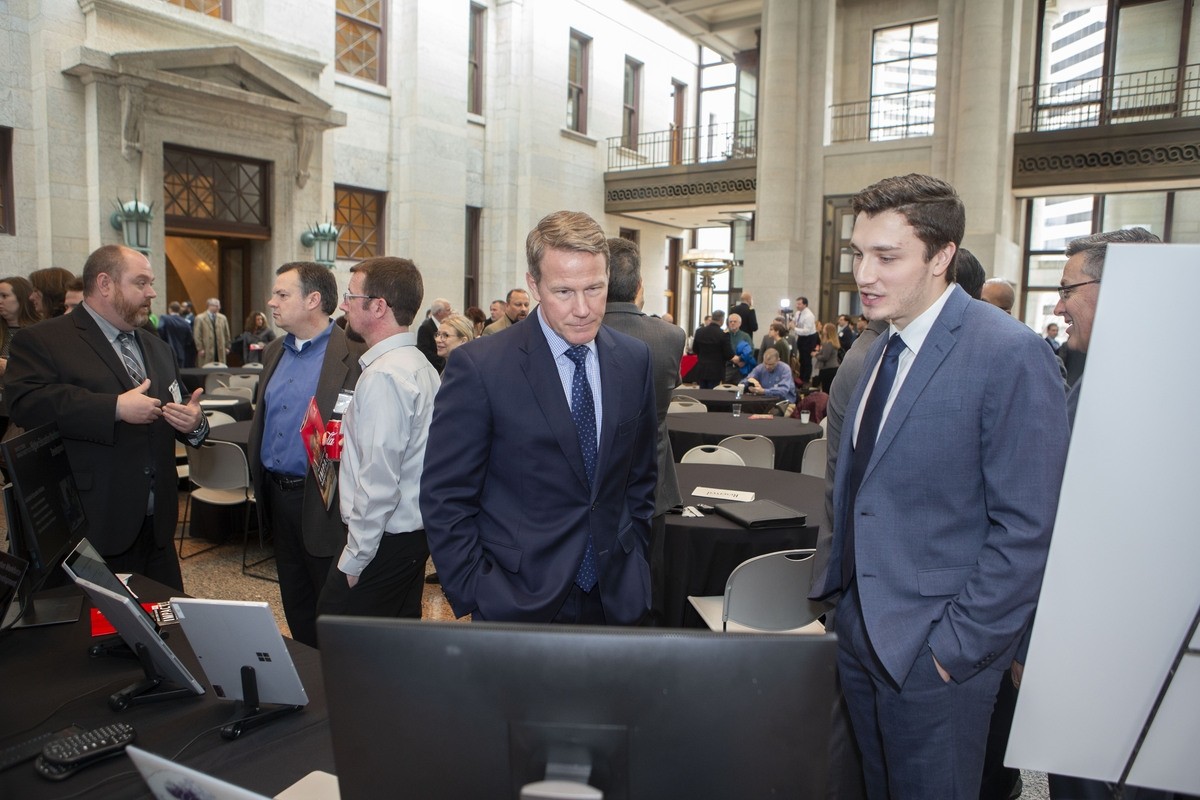
Digital ribbon-cutting opens the Ohio Cyber Range Institute
UC, state and military officials collaborate to get in front of cybersecurity threats
Ohio leaders and the University of Cincinnati took a major step toward securing cyberspace in the state and beyond with the March 3 official opening of the Ohio Cyber Range Institute.

Ohio Lt. Gov. Jon Husted (left) and Richard Harknett, professor and head of the Department of Political Science, chat with other participants during the March 3 ceremony. Harknett serves as co-director of the Ohio Cyber Range Institute and shares leadership responsibilities of the OCRI with Hazem Said, who also heads UC’s School of Information Technology, and Marc Cahay, head of UC’s Department of Electrical Engineering and Computer Science.
The Ohio Cyber Range Institute (OCRI) is an innovative and collaborative initiative that advances Ohio’s cybersecurity infrastructure while bolstering the state’s information technology talent pipeline.
“Securing the vitality of cyberspace is a national necessity," said OCRI co-director Richard Harknett, professor and head of the Department of Political Science at the University of Cincinnati. "Today, Ohio responds to that need.” Harknett is a leading cybersecurity expert and assisted the OCRI ribbon-cutting ceremony at the statehouse in Columbus, Ohio. Harknett shares leadership responsibilities of the OCRI with Hazem Said, head of UC’s School of Information Technology, and Marc Cahay, head of UC’s Department of Electrical Engineering and Computer Science.
The event drew an audience of about 150 attendees from state, military and academic institutions to the statehouse lobby for the event.
The OCRI, with network systems housed at UC on behalf of the state of Ohio, is a statewide tool that advances an integrated approach to education, economic and workforce development in cyber-related fields throughout the state. The platform includes K-20 educational programming; training opportunities, including incident response teams; industry workforce and economic development; cybersecurity research; and government agency support and programming for state and national priorities. The OCRI also supports the Ohio Cyber Civilian Reserve, a new state priority, as both a research and training partner.

UC President Neville Pinto (left) chats with Larry Johnson, dean of the College of Education, Criminal Justice and Human Services, during the event. photo/Joseph Fuqua II/UC Creative Services
I applaud our state leaders for supporting cross-disciplinary partnerships and innovative approaches that define the core of the new Cyber Range Institute.
UC President Neville Pinto
“We are in the midst of a digital transformation….and the opportunities that this transformation provides are enormous and energizing, to us as individuals to the companies and organizations that underpin our economy and way of life,” UC’s President Neville Pinto said in his remarks at the event. "But layered underneath everything in the digital world is a pervasive and growing threat to the security of the information and systems that are the backbone and lifeblood of the digital realm.
“I applaud our state leaders for supporting cross-disciplinary partnerships and innovative approaches that define the core of the new Cyber Range Institute,” said Pinto, citing the collaboration as an example of UC's Next Lives Here strategic plan.
The OCRI structure includes two core service sites at UC and the University of Akron providing computing power to support high schools and universities across the state. In addition, OCRI-regional programming centers will be established throughout Ohio, where students will work alongside industry professionals and educators.
The OCRI motto, “Unlocking Potential, Securing the Future,” is a message also being carried out by members of Cyber@UC, a more than 200-member student group involved in the OCRI cybersecurity effort.

Lt. Gov. Jon Husted and UC graduate student Michael Stengelmann discuss the OCRI network. Photo/Joseph Fuqua II/UC Creative Services
Cyber@UC representative Michael Sengelmann, a UC graduate student and computer science major in the College of Engineering and Applied Sciences, gave demonstrations at the event. He explained to visitors how OCRI training can range from teaching grade school students very simple consumer precautions (“If you can avoid public Wi-Fi that’s probably one of the best things you can do”) to teaching IT professionals high level malware reverse engineering.
The beauty of the OCRI network, Sengelmann said, is that: “The OCRI is a completely contained network,” so any training, such as the purposeful installation of a computer virus, are all conducted in a self-contained teaching tool.

Maj. Gen. John C. Harris, Jr., who is Ohio’s Adjutant General, also spoke during the ceremony. He is a member of the governor’s cabinet and is responsible for the command of the Ohio Army National Guard, Ohio Air National Guard, Ohio Military Reserve and Ohio Naval Militia.
The OCRI is one of many initiatives developed by the Ohio Cyber Collaboration Committee, an effort led by the state Adjutant General’s Department at the request of the governor’s office to improve cybersecurity infrastructure and provide innovative training and education to strengthen Ohio’s cyber workforce. “It’s the new generation of security and you are all part of making sure that Ohio is the leader,” said speaker Lt. Gov. Jon Husted who leads InnovateOhio, a nonprofit with a directive to use technology to transform Ohio’s communities.
The OCRI is a collaborative partnership involving five state agencies: the Ohio Adjutant General’s Department, Ohio Department of Higher Education, Ohio Department of Education, Ohio Department of Administrative Services and the Ohio Department of Public Safety.
Featured image: UC, state and military leaders attended the March 3 digital ribbon-cutting for the Ohio Cyber Range Institute. At the podium is Hazem Said, head of UC’s School of Information Technology, who also co-directs the OCRI. photo/Joseph Fuqua II/UC Creative Services
Next Lives Here
Next Lives Here, the University of Cincinnati’s strategic direction, defines our moment and our momentum. More nimble and more robust than a plan, Next Lives Here announces our vision to the world — to lead urban public universities into a new era of innovation, impact and inclusion.
Be a part of an institution that values academic excellence and apply today.
Related Stories
Pediatrician celebrates 30th UC College of Medicine reunion with...
April 3, 2025
There’s a vital thread woven into the fabric of Chris Peltier’s life. It’s black and red, and it knits all things Bearcat together into a life that was transformed by the University of Cincinnati and the UC College of Medicine.
UC students combine engineering and design experience
April 3, 2025
At the University of Cincinnati, the College of Design, Art, Architecture and Planning hosted a design competition with HAAG-Streit USA, where students were tasked with designing an ophthalmology workstation that is accessible and able to be incorporated into retail settings. Caleb Loayza, a mechanical engineering student at the College of Engineering and Applied Science, and Guy Mueller, an industrial design student, combined their expertise and took home first place.
UC to host paper shredding event on Bearcat Commons
Event: April 23, 2025 9:00 AM
The University of Cincinnati's Office of Information Security is hosting its annual spring Shred Event. Drop off your professional or personal documents to ensure they are securely destroyed and recycled.
